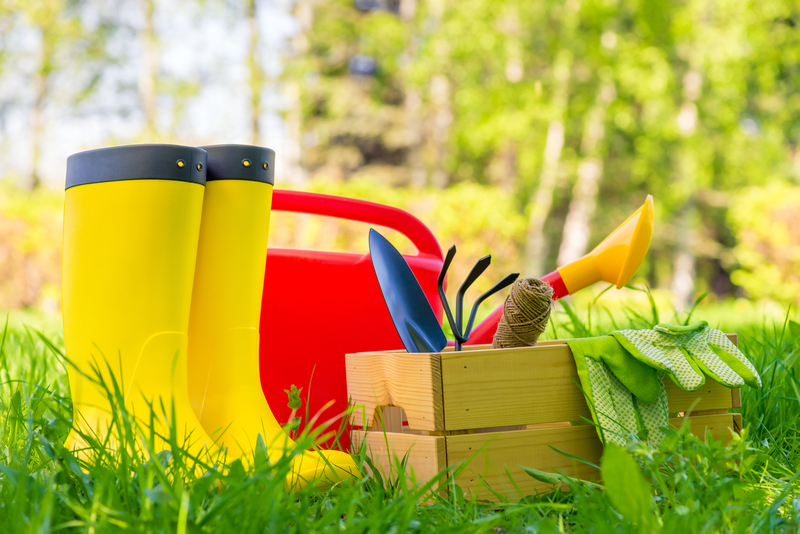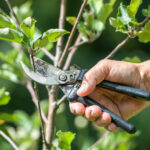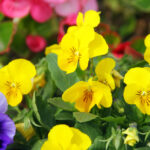
The secret to having a beautiful yard during the warm summer months is to start preparing in early spring. Bernie Mihm, co-owner of Fine Earth Landscape and a landscape architect, is an expert in this area. At Fine Earth, they do spring lawn and garden clean-up and prep for many of their clients, but with a bit of time and some guidance, you can perform these tasks yourself. Before you rush to a lawn and garden store, use the checklist below to make a plan.
 SPRING LAWN CARE STEPS
SPRING LAWN CARE STEPS
1. Seed Bare Spots
Although major aeration, major fertilizing, and overseeding are best done in early fall, it is certainly a good idea to heavily rake and seed bare spots in your yard. Apply a starter fertilizer to these areas. Keep the new seed moist, but don’t drench it.
2. Apply Pre-emergent Herbicide
Pre-emergent herbicide prevents weed growth before the weed seedlings can emerge, so one would apply this in spring in jurisdictions where lawn herbicides are allowed. However, it will also prevent your good grass seed from germinating so do not apply it on top of any newly seeded areas.
3. Use Fertilizer
Most cool season grasses like those we have in the Washington, DC area are typically fertilized in the fall. However, a light fertilization will help green-up your lawn in spring. Most lawns do not need phosphorus, so choose a fertilizer with 0 as the middle number. (Example 18-0-4). Be careful not to use too much fertilizer because it will run off into our streams and rivers when it rains.
4. Tune-Up Your Mower
To tune-up your mower, change the oil, spark plugs, and air filter. Fill the tires with air and remove old grass clippings and dirt. Finally, inspect the blades on your mower to see if they need to be sharpened or adjusted.
5. Mow Your Lawn
When the grass is long enough to require cutting, usually in early spring, it is time to start mowing about once a week. Adjust the mower to the highest setting, leaving the grass at about three inches tall. Avoid mowing the grass too low so that the roots can grow strong, and weeds will not take hold.
SPRING GARDEN CARE STEPS
1. Clean Out The Beds
The first step in preparing your garden for spring is to tidy up the beds where plants and flowers are to grow. Pull out weeds that are sprouting. Remove all old dead perennial leaves and any annual flowers that have not lasted the winter.
 2. Prune Shrubs And Trees
2. Prune Shrubs And Trees
Prune dead branches from any shrub or small tree in your garden. Cut old liriope (the evergreen perennial used for ground cover) down to about three inches or so, but no lower than that. There are entire books written on pruning, but the general rule is that spring flowering shrubs such as azaleas, forsythia, and spring flowering camellias should not be pruned heavily. Doing so will take off the flowers for the coming year. Click here to watch the video “Proper Pruning With Bernie” for more tips.
3. Apply Fertilizer
Apply a granular fertilizer around the trees, shrubs, and perennials, being careful to follow the directions. Too little is fine, but too much can harm or even kill your plants. Do not leave fertilizer on foliage; make sure all of it is on the ground. If you wish, you can use compost to fertilize. Following application of the fertilizer, be sure to gently water your plants and shrubs.
4. Edge The Garden Beds
Make a nice edge with a flat shovel or a power edger to define the beds. This way your yard is more attractive and the edge creates a “lip” that contains the mulch. Do not throw the edgings into the bed. Instead, take the edgings away or use them as fill somewhere else in your yard.
5. Add Mulch
Mulch is used to retain water in the soil, suppress weeds, and make the garden beds look good. It also helps plants survive by acting as a protective layer against heavy rain and cold temperatures. Mulch lightly; one inch of new mulch is plenty because too much mulch can harm the plants.
 6. Wait Until May For Annual Flowers
6. Wait Until May For Annual Flowers
Don’t be tempted to plant annual flowers such as begonias, petunias, and New Guinea impatiens before May. One small frost can kill every single annual flower. Instead, plant cold-tolerant flowers such as pansies and violas in deer-free areas in fall, let them overwinter, and enjoy their regrowth in spring. Just around the time they are ready to fizzle out in May, go ahead and plant your new annuals.
Alexa Lerner, Meridian Homes

